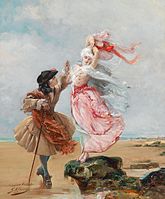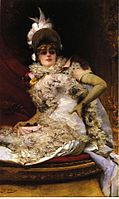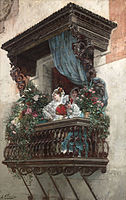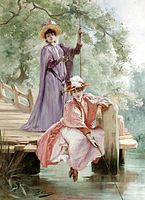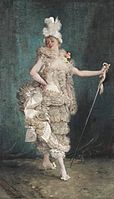Georges Clairin
Georges Clairin | |
|---|---|
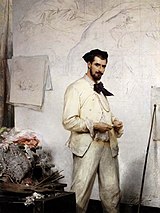 Georges Clairin depicted by Paul Mathey | |
| Born | 11 September 1843 |
| Died | 2 September 1919 Clohars-Carnoët, France |
| Nationality | French |
| Education | Isidore Pils; François-Édouard Picot; École des beaux-arts de Paris |
| Movement | Orientalist |
Georges Jules Victor Clairin (11 September 1843, Paris – Pouldu, Clohars-Carnoët 2 September 1919) was a French Orientalist painter and illustrator. He was influenced by Eastern imagery Moorish architecture, and visited North Africa many times, in particular Algeria, Morocco and Egypt. In Paris he led the life of a socialite, and befriended the glamorous actress Sarah Bernhardt, his friend for 50 years, and is today best known for his 'in costume' and informal intimate portraits of her.[1]
Life
[edit]
Clairin was apprenticed in the workshops of Isidore Pils and François-Édouard Picot. In 1861 he entered the École des beaux-arts de Paris,[1] and in 1866 first displayed his work. He travelled to Spain with Henri Regnault and to Italy with François Flameng and Jean-Léon Gérôme. He met the Catalan painter Marià Fortuny in Morocco and they visited Tétouan together.[2] In 1895, he travelled to Egypt with the composer Camille Saint-Saëns.
He is best known for his portraits of Sarah Bernhardt, with whom he had a long friendship and whom he depicted in costume for a number of her roles, including as the queen in Ruy Blas (1879), Mélisande in La Princesse Lointaine (1895 and 1899), Cleopatra (1900), Theodora (1902) and Saint Teresa of Ávila; he also showed her in less formal poses. Clairin painted many ceilings, among them the foyers of the Opéra Garnier (1874) and the Le Trident, the theatre of Cherbourg.
He was the uncle of the painter Pierre-Eugène Clairin.

Portrait of Sarah Bernhardt, 1876
[edit]Clairin's 1876 portrait of Sarah Bernhardt drew praise. Théodore Véron said of it:
The portrait of Mademoiselle Sarah Bernhardt is assuredly one of the most prominent of the Salon, as much for the originality of its composition as for the splendour of its colour.[3][4]
Monsieur Clarin shows us her wrapped in a long robe of white satin with a trailing train, she is resting on a luxurious divan of pink satin and leaning on a cushion of the same material draped in gold; to her right and in the depths of this Oriental apartment is a Venetian mirror surrounded by purple velvet curtains; to her left a tropical plant lowers its green leaves over the meditating actress and sculptress; at here feet a yellow hound of a large breed rests on its long legs and stretches out its proud and aristocratic head.[4][5]
Emile Zola found that: "Mademoiselle Sarah Bernhardt isn't pretty but she has fine intelligent features and Clairin has been able to give her a smooth little face and vulgar sensuality like Cabanel would paint."[6]
Works
[edit]- Entrée à la mosquée du Chérif de Ouassam (1875)
- Les Favorites du sultan (1875)
- À l'extérieur du harem (1875)
- Portrait de Sarah Bernhardt (1876)
- Les brûleuses de varech à la Pointe du Raz (1882)
- Danseuse Ouled-Naïl (1885)
- L'Asie, L'Afrique (1889), Bourse de commerce de Paris
- Le Carnage (1890), Princeton University Art Museum
- Frou-Frou (1892)
- Fête fleurie
- Au balcon
- À l'opéra
- Portrait d'Alexandre Dumas fils
- Soldats français devant le temple de Karnak (1897)
- Sarah Bernhardt en Cléopâtre (1900)
- Retour des conscrits (désert d'Égypte) (1900)
- Marché à Madrid (1907) shown at the salon
- La Fantasia au Maroc (1907) shown at the salon
- Allah ! Allah ! (1908) shown at the salon
- Au lever du soleil, les moissonneurs arabes font leur prière (1909) shown at the salon
- Portrait de M. Terace à cheval, ministre de France à Tanger
-
A galant couple from c. 1919
-
An Ouled Nail Tribal Dancer, 1895
-
On the Balcony, c. 1910
-
La Fête fleurie
-
Actress in the role of Ophelia
-
At the Opera, c. 1900
-
Spanish Women on Balcony
-
Sarah Bernhardt
-
Walk in the Woods, c. 1900
-
Frou Frou, 1882
-
À l'opéra, or At the Opera, c 1900
-
A lake with Naiads, c 1900
-
The distant Princess, c 1900
-
Young woman in the morning, 1909
Notes and references
[edit]- ^ a b "Georges-Jules-Victor Clairin Archived 2015-09-06 at the Wayback Machine". M.S. Rau Antiques, New Orleans. Retrieved 7 June 2014
- ^ Lynne Thornton (1985), www.acr-edition.com (ed.), La Femme dans la peinture orientaliste, www.acr-edition.com, p. 264, ISBN 2867700116, p. 232.
- ^ Le portrait de Mme Sara Bernhardt est assurément une des œuvres les plus saillantes du Salon, tant par l'originalité de la composition que par la splendeur du coloris
- ^ a b Théodore Véron (1876). Le salon de 1876 : mémorial de l'art et des artistes de mon temps. Poitiers.
{{cite book}}: CS1 maint: location missing publisher (link) - ^ M. Clairin nous la représente enveloppée dans un long peignoir de satin blanc à queue traînante, elle est étendue sur un riche divan de satin rosé, et accoudée sur un coussin de même étoffe chamarrée d'or; à sa droite et dans le fond de cet appartement tout oriental, est une glace de Venise entourée de rideaux de velours violet; à sa gauche une plante tropicale abaisse ses larges feuilles vertes sur l'actrice et sculpteur en méditation; à ses pieds, un lévrier jaune de grande race repose sur ses longues pattes et allonge sa tête fière et aristocratique
- ^ Mlle Sarah Bernhard n'est pas jolie, mais elle a des traits fins et intelligents dont Clairin n'a su faire qu'un minois régulier et vulgairement sensuel tel que le peindrait un Cabanel "( Salon de 1876)
Bibliography
[edit]- Christine Peltre, Dictionnaire culturel de l'orientalisme, Éditions Hazan, Paris, 2008 ISBN 2-85025-882-2
See also
[edit]External links
[edit]- Discussion of Portrait of Sarah Bernhardt by Janina Ramirez and Christophe Leribault: Art Detective Podcast, 12 April 2017

